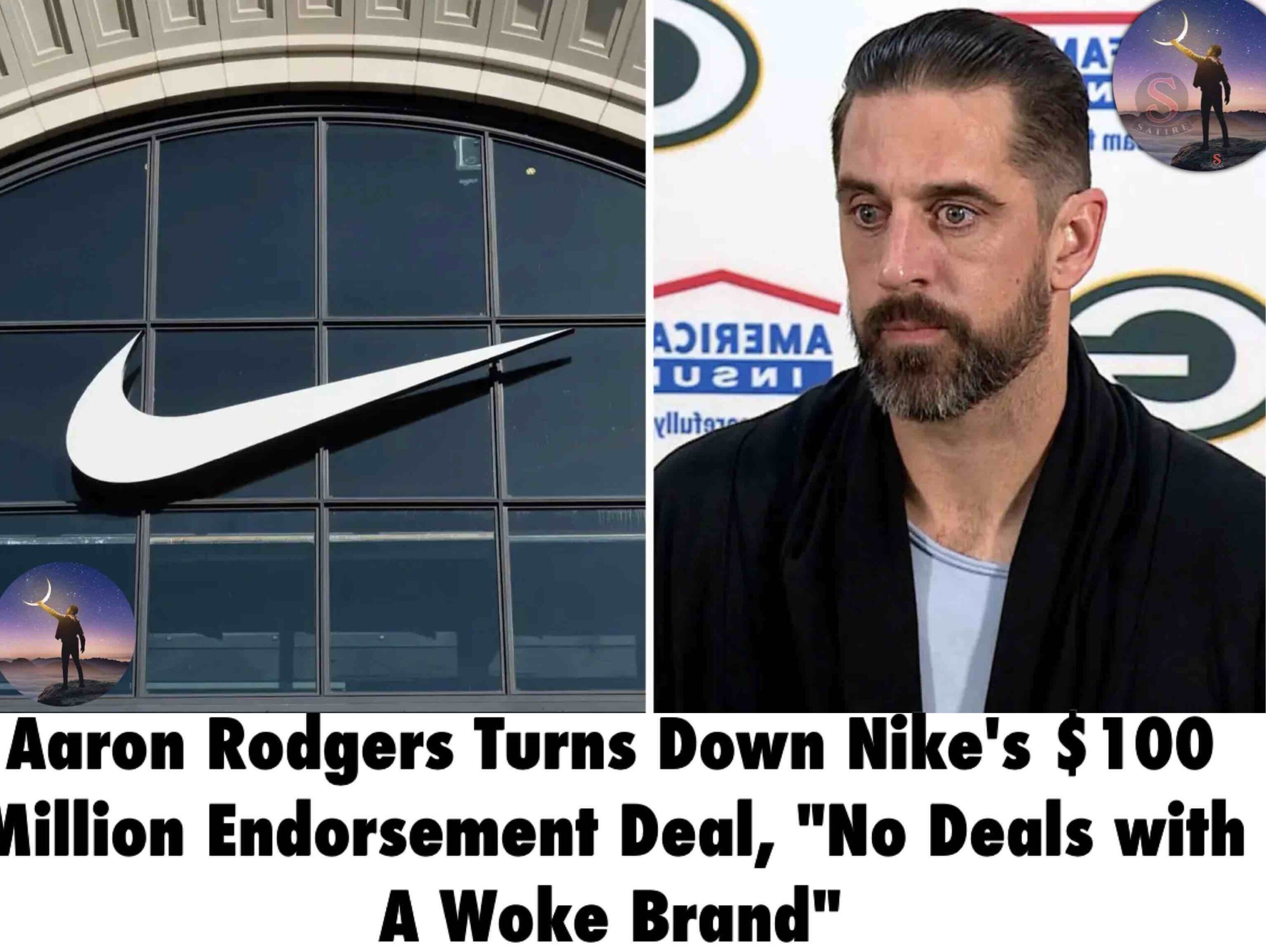In a surprising twist in the world of professional sports, where endorsements and lucrative deals often intertwine with athletes’ personal values, Green Bay Packers quarterback Aaron Rodgers recently made headlines by turning down a staggering $100 million offer from Nike. This decision sent shockwaves through the sports and business communities, challenging the traditional relationship between athletes and corporate endorsements.
Rodgers’ rejection went beyond the financial aspect, serving as a bold statement against what he perceives as the increasingly “woke” culture associated with certain brands. This article explores the nuances of Rodgers’ decision, delving into the complex dynamics between athletes and corporate endorsements in an era where social and political stances can redefine careers.
When the news broke that Nike had extended a $100 million endorsement deal to Aaron Rodgers, the sports world collectively raised its eyebrows. The astronomical figure reflected Nike’s desire to align itself with one of the NFL’s most prominent figures. However, Rodgers surprised everyone by declining the offer, citing concerns about the brand’s perceived “wokeness.”
The term “woke” has become a buzzword associated with companies and individuals expressing heightened social consciousness. In Rodgers’ case, his rejection of Nike’s offer illuminated the intricate relationship between athletes and corporations. As athletes increasingly leverage their platforms for social justice and political causes, some, like Rodgers, question whether aligning with “woke” brands compromises their authenticity.
Rodgers’ decision to refuse Nike’s substantial offer wasn’t driven by a disdain for social responsibility. Instead, it was a strategic move to distance himself from what he perceives as performative activism. In interviews following the rejection, Rodgers emphasized the importance of genuine social impact over symbolic gestures. His stance raises questions about the balance athletes must strike between leveraging their influence for positive change and avoiding associations with brands that may dilute their message.
Athletes in the modern era are more than just competitors on the field; they are brands themselves. Endorsements have become a crucial component of an athlete’s portfolio, often rivaling or surpassing their playing contracts. However, as Rodgers’ case exemplifies, these partnerships are no longer solely about exposure and revenue; they also carry significant weight in the court of public opinion.
While Rodgers’ decision may have initially seemed like a personal choice, it sparked a broader conversation about corporations and their alignment with social causes. As major brands increasingly embrace activism in their marketing strategies, athletes are forced to navigate a landscape where financial gain intersects with principles. Nike, known for its iconic partnerships with outspoken athletes, now finds itself under scrutiny for its role in the evolving conversation around corporate activism.
Aaron Rodgers’ resounding rejection of Nike’s staggering $100 million offer isn’t merely a financial decision; it’s a seismic event that reverberates through the corridors of professional sports. It signals a paradigm shift in the relationship between athletes and corporate entities, with ramifications extending far beyond the football field. This decision unravels a complex tapestry that weaves together individual principles, corporate agendas, and the broader societal discourse.
In the contemporary landscape, athletes are no longer mere endorsers; they are influential voices in cultural conversations. The days when an athlete’s primary role was confined to the playing field have given way to a new era where their impact extends into realms far beyond sports. Aaron Rodgers, a seasoned quarterback with a storied career, is emblematic of this shift—a shift that underscores the nuanced dynamics between athletes and the brands vying for their endorsement.
As we delve deeper into the intricacies of Rodgers’ decision, it becomes evident that his stance transcends the traditional transactional nature of endorsement deals. It represents a bold declaration by an athlete who is not only conscious of his personal brand but also attuned to the broader ethos of social responsibility. By rejecting Nike’s lucrative offer, Rodgers places himself at the forefront of a growing cohort of athletes who demand a more profound alignment between their values and the brands they choose to represent.
The rejection serves as a powerful rebuke against what Rodgers perceives as the performative nature of corporate activism—the “wokeness” that has become synonymous with certain brands. In an era where authenticity is paramount, athletes like Rodgers are asserting their agency, refusing to be mere figureheads for causes they may not wholly endorse. The decision invites us to contemplate the fine line that athletes must walk, balancing the pursuit of social change with a genuine commitment to causes that resonate with their core beliefs.
While Rodgers’ rejection undoubtedly sends shockwaves through the endorsement landscape, its impact extends to the heart of the ongoing discourse around corporate responsibility. Major brands, especially those in the realm of sports, have increasingly incorporated social and political messaging into their marketing strategies. Yet, Rodgers’ decision prompts a critical reassessment of whether these efforts are perceived as authentic contributions to societal progress or merely opportunistic endeavors to capitalize on prevailing sentiments.
In the broader context, this rejection prompts a reevaluation of the role of corporations in shaping cultural narratives. Nike, a global powerhouse synonymous with iconic athlete partnerships, now finds itself under the scrutiny of a broader conversation about the intentions and impact of corporate activism. As athletes like Rodgers become more discerning in their partnerships, brands must navigate the delicate terrain of aligning with causes without being perceived as exploitative or insincere.
The fallout from Rodgers’ decision isn’t confined to boardrooms; it spills into the public domain, where fans, pundits, and consumers engage in a multifaceted dialogue. The rejection becomes a touchstone for discussions around the intersections of sports, business, and social justice—a nexus that continues to evolve as athletes assert their agency in shaping the narratives that define them.
In essence, Aaron Rodgers’ refusal of Nike’s offer stands as a watershed moment, prompting a redefinition of the athlete-brand dynamic. It is a clarion call for authenticity, a declaration that athletes are not mere billboards for brands but active participants in shaping the cultural conversation. As we navigate this new terrain, one thing becomes clear: the choices athletes make regarding endorsements will increasingly reflect not just their personal brands but their profound impact on the broader societal narrative.


